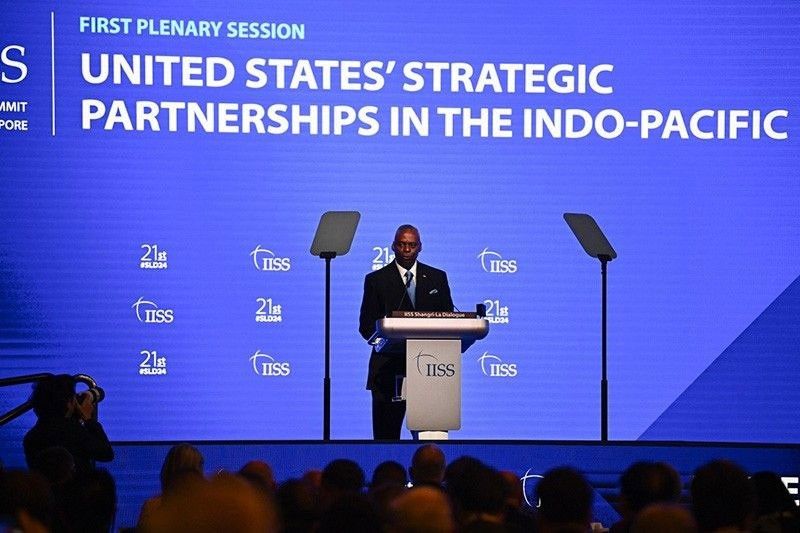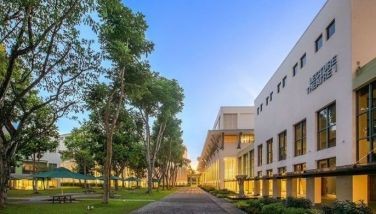US on securing Asia: We’re not going anywhere

SINGAPORE – Asia-Pacific remains Washington’s “priority theater of operations,” US Defense Secretary Lloyd Austin said yesterday, noting “the United States can be secure only if Asia is.”
“We are all in and we’re not going anywhere,” Austin said at the Shangri-La Dialogue, a major security forum attended by defense officials from around the world.
The Philippines, a US treaty ally, is a key focus of Washington’s efforts to build an arc of alliances across the region.
Given its position in the South China Sea and proximity to self-ruled Taiwan, which China claims as its own, Philippine support would be crucial for the US in the event of any conflict.
The Philippines has increased to nine the number of military bases open to US troops under the 2014 Enhanced Defense Cooperation Agreement between the two countries. At least two of the bases are in the Philippines’ far north less than 450 kilometers from Taiwan.
Austin insisted yesterday that Washington’s commitment to defend the Philippines under their mutual defense treaty remained “ironclad,” as repeated confrontations between Chinese and Philippine vessels in the South China Sea have stoked fears of a wider conflict.
President Marcos, who keynoted the security forum, said on Friday that the “stabilizing presence of the United States is crucial to regional peace.”
In his own speech, Austin lauded how Marcos “spoke so powerfully last night about how the Philippines is standing up for its sovereign rights under international law.” But when pressed later, he would not say how the US might react if a Filipino were killed in a confrontation with China, calling it hypothetical.
“There are a number of things that can happen at sea or in the air, we recognize that,” he said. “But our goal is to make sure that we don’t allow things to spiral out of control unnecessarily,” he added.
Austin hailed a “new era of security” in the Asia-Pacific region, as Washington strengthens its network of alliances aimed at countering China’s growing military might and influence.
From Japan to Australia, the US has been deepening defense ties across the region, ramping up joint military exercises and regularly deploying warships and fighter jets in the Taiwan Strait and South China Sea – infuriating Beijing.
NATO Asian version?
Responding to Austin, Chinese Lieutenant General Jing Jianfeng accused the US of seeking to build “an Asia-Pacific version of NATO (North Atlantic Treaty Organization),” and described the superpower as the “greatest challenge to regional peace and stability.”
Chinese Senior Col. Cao Yanzhong, a researcher at China’s Institute of War Studies, also asked Austin whether the US was trying to create an Asian version of NATO with its emphasis on partnerships and alliances, a common Chinese claim. He suggested that could trigger conflict with China, citing ally Russia’s claim that NATO’s eastward expansion was a threat, which President Vladimir Putin has used as an excuse for his invasion of Ukraine.
“The eastern expansion of NATO has led to the Ukraine crisis,” Cao said. “What implications do you think the strengthening of the US alliance system in the Asia-Pacific will have on this region’s security and stability?”
Austin said the US is simply cooperating with “like-minded countries with similar values” and not trying to create a NATO-type alliance, while rejecting Cao’s interpretation of the cause of the Ukraine war.
“The Ukraine crisis obviously was caused because Putin made a decision to unlawfully invade his neighbor,” Austin said.
In the past three years, the US defense chief said there had been a “new convergence around nearly all aspects of security” in the Asia-Pacific, where there was a shared understanding of “the power of partnership”.
“This new convergence is producing a stronger, more resilient and more capable network of partnerships and that is defining a new era of security in the Indo-Pacific,” Austin said.
It was not “about imposing one country’s will” or “bullying or coercion,” Austin said in an apparent shot at China, which has increased its saber-rattling over Taiwan and grown more confident in pressing its claims in the South China Sea.
“This new convergence is about coming together and not splitting apart,” Austin pointed out. “It’s about the free choices of sovereign states.”
The Shangri-La Dialogue has become a barometer of US-China relations in recent years.
This year’s edition comes a week after China held military drills around Taiwan and warned of war over the US-backed island following the inauguration of President Lai Ching-te, who Beijing has described as a “dangerous separatist.” Taiwan is one of the thorniest complications in US-China relations.
Austin met with his Chinese counterpart Dong Jun on Friday for the first substantive face-to-face talks between the two countries’ defense chiefs in 18 months.
China scrapped military communications with the United States in 2022 in response to then-US House Speaker Nancy Pelosi’s visit to Taiwan.
Tensions between Washington and Beijing were further stoked by issues including an alleged Chinese spy balloon that was shot down over US airspace, a meeting between Taiwan’s then-president Tsai Ing-wen and Pelosi’s successor Kevin McCarthy, and American military aid for Taipei.
- Latest
- Trending

































